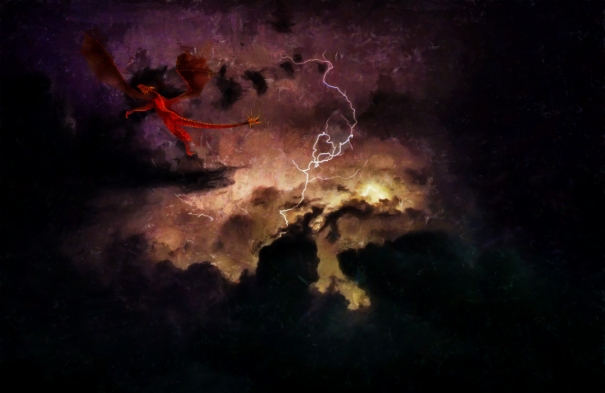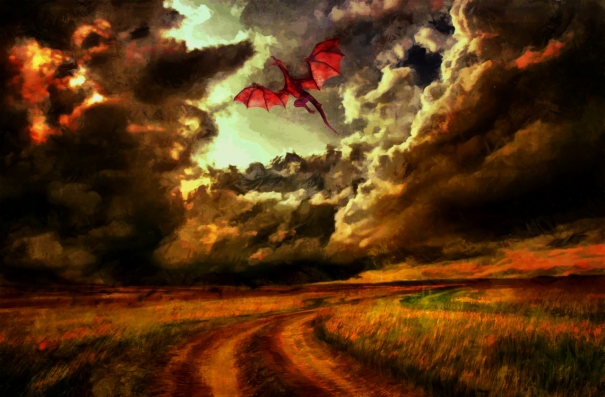My late grandpa had one, courtesy, I suspect, of a vile combination of genetics and the impact of the first world war. He had ‘shell shock’, for which read PTSD, the result of surviving several years in the trenches as a gunner. He only talked about it to me once but mentioned, almost jokingly, that he only survived because the gun under which he had been buried by a shell blast, was dug up by his colleagues as they did not want to lose it… He was gassed, shot and saw the death of all his close friends, and saw the lines of people sawn in half by the product of his gun. He came back with white hair and shell shock.
He could be thoughtful, helpful, organised and affectionate, but not often and not for very long at a time. Mostly he was just morose, withdrawn, but when the dragon awoke he could turn in a flash into a raging temper. One day when I was about six, my persistent grand prix car noise imitations got too much for him and he swept up all my favourite toy cars and threw them into the dustbin just before the bin-men came.
Poor chap had to be locked in his bedroom at nights during the difficult times so he did not go walkabout in the night and he used to scream in his sleep. It must have been hell. My grandmother (and therefore my late father) thought he was weak, but he wasn’t. He was one of the strongest men I have ever known. I wish I could tell him how much I admire him, but I found out far to late for that.
Despite everything, he worked as a waterman on the River Thames from the day he was demobbed after the war until his retirement at 65, he bought up his son, my father, kept his family together, bought, with my grandma, a succession of very nice houses and was generally what society would consider successful. Despite everything, he was not an alcoholic, though he had every reason to become one, and his only vice was nicotine from the vile smelling pipe invariably clenched between his teeth. It soothed the dragon I think.

My dad had one, courtesy, I suspect, of the same genetics coupled with a childhood dominated by grandpa’s PTSD. He regarded all mental health issues as ‘personal weakness’ – his words not mine. He suffered from migraines but refused to accept that migraine existed – too close to mental health issues and personal weakness. Had a psychiatrist ever seen him in full rage mode, or been driven by him, he might well have diagnosed borderline personality disorder. He worked with lots of psychologists about whom he tended to speak disparagingly at home whilst secretly and grudgingly respecting them and even becoming close friends with some… Some of them must have had their suspicions, but his iron will, brilliance, charisma and organisational flair made him an exceptionally good manager and so if they did, they kept their mouths firmly shut (not least because he was their boss rather than the reverse).
He could be thoughtful, helpful, interesting, amusing, organised and affectionate. Often, especially when tired, he was morose, withdrawn and grumbly but when the dragon awoke he could turn in a flash into a raging temper. Sound familiar? He learned well from a master, my grandpa. He could be completely impossible. Once when my better half was navigating across France he said, ‘I don’t want to go through Vic Fezansac as it is market day.’ There were no turnings between our current location and VF. He shouted louder and louder and drove faster and faster as it was suggested that there was no alternative other than to turn around. We went through VF at a horrendous pace, children and chickens leaping in all directions. His behaviour was rude and dangerous – the dragon was well and truly in control.
On one notable occasion, as I wrote recently elsewhere, my dad drove round and round the same roundabout in Birmingham UK until I gave the right answer to a simple algebraic problem. He didn’t understand why I didn’t understand. For me, if x=3 then it can’t possibly equal 17 in the next problem… I never did get the right answer and we left the roundabout with him screaming the refrain of my childhood ‘I don’t understand how someone so intelligent can be so stupid!’ I never really got over that, not even when Cambridge University was my employer and the authors of the standard Advanced level Biology texts used to ring me up to explain things to them… When he died three weeks after retiring, I had just begun to make friends with him. I loved him then, always have, always will, but for prolonged periods of my childhood I also hated him, hated the dragon. I was heartbroken when he died and am in tears writing this, 35 years later. I loved him and I had just wanted the opportunity to learn to like him and it was whisked away. I was very, very angry.
Despite everything, he worked as a scientist, lecturer, professor and Head of a major organisation, from the day he left medical school until his retirement at 50, he bought up three children, including me, kept his family together, bought, with my mother, a succession of very nice and increasingly large and numerous houses and was generally what society would consider extremely successful. Despite everything, he was not an alcoholic, though he had every reason to become one, and his only vice was nicotine from the vile smelling pipe or home-made cigar invariably clenched between his teeth. He only gave it up after a health fright, a transient ischemic attack (TIA) not long before his untimely death from a leptospirosis infection. It soothed the dragon I think.

Of course I too live with the dragon inside my head. I have the same genetic predisposition. I have PTSD courtesy of a violent predatory paedophile who abused me while I was living and holidaying with my grandma – in those days children did not know about such people and I had not the words to tell anyone what was happening to me. That combined with the impact of my dad’s dragon also changed my personality – anyone who has been driven by me for any period of time will know that I am a risk-taker, and of course, there’s the dragon. I was diagnosed about 10 years ago with Borderline Personality Disorder as a result and can’t really escape from the accuracy of any description of the symptoms – like many others with BPD I have had it under control a lot of the time – except behind the wheel.
As I wrote recently elsewhere, I drove for 40 years. I thought I was brilliant at it and frightened everyone else nearby for about the first 20 years. Then I realised that I was an idiot when behind the wheel and became reasonably safe at least 50% of the time. I loved the thrill of risk taking inherent in every journey. In our old Volvo I celebrated 100,000 miles at 100 mph and 120,000 at 120mph (on private roads I’d like to be able to say) and if it could have gone any faster would doubtless have continued the same way until it expired at 265,000 miles. It was the fastest standard 940SE in the world because I thrashed the nuts off it for all but the first 20,000 miles of its life. That it never exploded or broke down is a testament to Volvo’s incredible engineering. I once took a very experienced racing driver for a ride in my sports car (Reliant Scimitar SE5a for the aficionados among you) and scared the living daylights out of him.
I had a repeated car failure in Angers, France on holiday one year and this ended with two fabulous illustrations of BPD behaviour. The 9th time the car, a French Citroen, broke down on the same roundabout I leapt out of the car and ran around it screaming abuse at it and kicking it. The French thought it hilarious. Eventually I persuaded it to run, but only at full throttle. With a howl of delight I leapt into the car and drove the next 400 miles at terminal velocity, causing consternation in a variety of French villages and extracting more road holding from it than seemed possible at each set of twists and turns. How we survived I shall never know. Ask my better half about it if you don’t believe me as she was sat in stunned silence through most of the journey interspersed by occasional sharp intakes of breath.
Borderline Personality Disorder does not necessarily go too well with driving, but astonishingly I had only one crash (rear-ending a car which stopped while I was thinking about something else) after 6 months of driving and then, no bumps, no tickets (not even parking tickets) – none at all – absolutely miraculous and completely undeserved. I don’t drive now, but that is my choice, as I can’t remember where I am going for more that 5 seconds, nor concentrate properly for more than 5 minutes. Even I recognise that is not really a recipe for safe driving.
So, for the first 55 years of my life I had a genetic/PTSD and BPD variant of the dragon. Then I got whatever rare and horrible motor neuron disease it is that I have. It has affected my brain and reduced the effectiveness of many of the filters that are required to allow human beings to exist together in society and families. The language as I have been (badly) typing this has been excruciating – I appear to know words I didn’t know I knew and certainly never used before this illness took hold. The first draft used some fruity language but hopefully I removed it all. Wonder if you can spot where it was? And the leash on the dragon is no longer under a reasonably secure grip. So my poor family suffer as I misunderstand things and instead of rationally asking for clarification, the dragon roars. I’m profoundly sorry.
Despite everything, I worked as a scientist, teacher, Head of Science and Subject officer for the Cambridge University International exam board from the day I left university until my unexpected retirement at 56 (I think), I bought up three children, kept my family together, bought, with my wonderful wife, a small number of very nice and increasingly large houses and was generally what society would consider very successful. Despite everything, I am not an alcoholic, though I had every reason to become one, and my only vice is nicotine that used to come from vile smelling roll-ups and latterly from those vape sticks. Luckily I have found a brand of vape juice that is incredibly cheap because they omit the nice tasting smelly stuff that used to trigger my better half’s asthma.
I quote Mark Twain, “Giving up smoking is the easiest thing in the world. I know because I’ve done it thousands of times.” How true – it is easy to give up, near impossible to stay given up. Regrettably, my large intestine is now virtually paralysed. It is full of nicotinergic nerve endings and nicotine is the only thing keeping it going. Last time I tried to stop my nicotine intake I ended up in A and E (ED/ER) with an impaction which blocked my bladder; in agony with over a litre of urine backed up in the system. So once again I can’t do without it. Bother.
And it soothes the dragon I think.

So how do you live with a dragon inside your head? With difficulty, but successfully, as three generations of my family can testify…

The paintings are all tacked together and recoloured and modified from public domain images and then painted using a favourite dark retro grunge method in Dynamic painter, except the last which is a much modified impressionistic repaint of a public domain ‘photographic style’ painting.
I think a quote from the book of Job in the old testament says how it sometimes feels, “Surely, O God, you have worn me out; you have devastated my entire household.” Job 16:7 but then Jesus never said it would be easy! He says in Matthew 7:13-14 ‘Enter through the narrow gate; for the gate is wide and the road is easy that leads to destruction, and there are many who take it. For the gate is narrow and the road is hard that leads to life, and there are few who find it.’ and Matthew 8:16 ‘If anyone wishes to come after Me, let him deny himself, and take up his cross, and follow Me.’
And at least I am confident that the dragon in my head will not separate me from God’s love, as Paul writes in Romans 8:35, ‘Who shall separate us from the love of Christ? Shall trouble or hardship or persecution or famine or nakedness or danger or sword?’ Absolutely not! Paul carries on in verse 37 ‘No, in all these things we are more than conquerors through him who loved us. For I am convinced that neither death, nor life, nor angels, nor rulers, nor things present, nor things to come, nor powers, nor height, nor depth, nor anything else in all creation, will be able to separate us from the love of God in Christ Jesus our Lord.’
Luckily, my son describes his childhood as ‘idyllic’ and says the worst thing in it was when the BBC showed a film with no adverts so he could go for a comfort break, so finally, after three generations there is a male offspring without a dragon in his head – hurrah!

I rarely read carefully a long blog post but yours I did. Your post was well organized and written. It lead through the generations and I read even more in between the lines. You have time I hope to enjoy a positive relationship with your son and I hope you and him will enjoy creating stories that he will enjoy sharing, ones with laughter, sunshine and love.
LikeLiked by 1 person
Thank you so much! You are very kind about my writing and I really appreciate that confidence booster. I have been lucky enough to enjoy a wonderful relationship with my son, who still lives at home at 27, by choice as he could easily move out if he wanted to. He says, by the way, that his head is stuffed full of dragons, but fortunately these are the products of his creative imagination rather than the controlling, roaring kind!
LikeLiked by 1 person